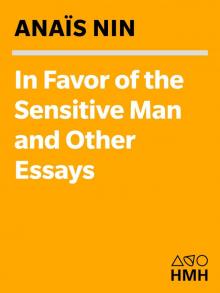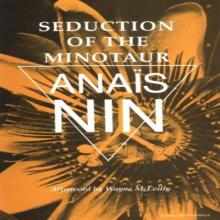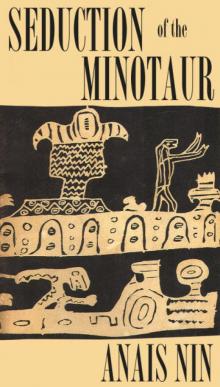Seduction of the Minotaur coti-5 Read online
Page 3
Simultaneously they returned to the present.
Lillian said: “There is a quality in this place which does not come altogether from its beauty. What is it? Is it the softness which annihilates all thought and lulls the body for enjoyment? Is it the continuity of music which prevents thoughts from arresting the flow of life? I have seen other trees, other rivers; they did not have the power to intoxicate the senses. Do you feel this? Does everyone feel this? Is this what kept South Seas travelers from ever returning home?”
“It does not affect everyone in the same way,” said the Doctor with bitterness in his voice, and Lillian realized he was thinking of his wife.
Was this the mystery in Doctor Hernandez’s life? A wife he could not win over to the city he liked, the life he loved?
She waited for him to say more. But he was silent, and his face had become placid again.
Her hand, which she had left in the waters of the lagoon to feel the gliding, the uninterrupted gentleness of the flowing, to assure herself of this union with a living current, she now felt she must lift, to prove to the Doctor that she shared his anxiety, and that his sadness affected her. She must surrender the pleasure of touching the flow of water, as if she were touching the flow of life within her, out of sympathy for his anguish.
As she lifted her hand and waited for the drops of water to finish dripping from it, a shot was heard, and water spattered over her. They all three sat still, stunned.
“Hunters?” she asked. She wanted to stand up and shout and wave so the hunters would know they were there.
The Doctor answered quietly: “They were not hunters. It was not a mistake. They intended to shoot me, but they missed.”
“But why? Why? You’re the most needed, the most loved man here!”
“I refuse to give them drugs. Don’t you understand? As a doctor I have access to drugs. They want to force me to give them some. Drugs for forgetting. And I have no right to do this, no right except in cases of great physical pain. That’s why when you compared Golconda to a drug I felt bitter. For some people, Golconda is not enough.”
The fisherman did not understand their talk in English. He said in Spanish, with a resigned air: “Bad hunters. They missed the crocodile. I could catch him with my bare hands and a knife. I often have. Without guns. What bad hunters!”
The swimming pool was at the lowest level of the hotel and only about ten feet above the sea, so that it was dominated by the roar of the waves hurling themselves against the rocks. The quietness of its surface did not seem like the quietness of a pool but more like that of a miniature bay formed within rocks which miraculously escaped the boiling sea for a few moments.
It did not seem an artificial pool dug into cement and fed by water pipes, but rather one of the sea’s own moods, one of the sea’s moments of response, an intermittent haven.
It was surrounded by heavy, lacquered foliage, and flowers so tenuously held that they fell of their own weight into the pool and floated among the swimmers like children’s boats.
It was an island of warm, undangerous water in which one man at least had sought eternal repose by throwing himself out of one of the overhanging hotel windows. Ever since that night the pool had been locked at midnight. Those who knew that the watchman preferred to watch the dancers on the square and that the gate could easily be leaped over, came to sit there in the evenings before going to sleep. The place was barred to any loud frivolity but open for secret assignations after dancing.
It was also Lillian’s favorite place before going to sleep. The gentleness of the water, its warmth, was the lulling atmosphere she had missed when she had passed from childhood to womanhood.
She felt an unconfessed need of receiving from some gentle source the reassurance that the world was gentle and warm, and not, as it may have seemed during the day, cold and cruel. This reassurance was never granted to the mature, so that Lillian told no one of the role the pool played in her life today. It was the same role played by another watchman whom she had heard when she was ten years old and living in Mexico while her father built bridges and roads. The town watchman, a figure out of the Middle Ages, walked the streets at night chanting: “All is well, all is calm and peaceful. All is well.”
Lillian had always waited for this watchman to pass before going to sleep. No matter how tense she had been during the day, no matter what catastrophes had taken place in school, or in the street, or at home, she knew that this moment would come when the watchman would walk all alone in the darkened streets swinging his lantern and his keys, crying monotonously, “All is well, all is well and calm and peaceful.” No sooner had he said this and no sooner had she heard the jangling keys and seen the flash of his lantern on the wall of her room, than she would fall instantly asleep.
Others who came to the pool were of the fraternity who liked to break laws, who liked to steal their pleasures, who liked the feeling that at any time the hotel watchman might appear at the top of the long stairs; they knew his voice would not carry above the hissing sea, and that as he was too lazy to walk downstairs he would merely turn off the lights as if this were enough to disperse the transgressors. To be forced to swim in the darkness and slip away from the pool in darkness was not, as the watchman believed, a punishment, but an additional pleasure.
In the darkness one became even more aware of the softness of the night, of pulsating life in the muscles, of the pleasure of motion. The silence that ensued was the silence of conspiracy and at this hour everyone dropped his disguises and spoke from some realm of innocence preserved from the corrosion of convention.
The Doctor would come to the pool, leaving his valise at the hotel desk. He talked as if he wanted to forget that everyone needed him, and that he had little time for pleasure or leies, who li But Lillian felt that he never rested from diagnosis. It was as if he did not believe anyone free of pain, and could not rest until he had placed his finger on the core of it.
Lillian now sat in one of the white string chairs that looked like flattened harps, and played abstractedly with the white cords as if she were composing a song.
The Doctor watched her and said: “I can’t decide which of the two drugs you need: the one for forgetting or the one for remembering.”
Lillian abandoned the harp chair and slipped into the pool, floating on her back and seeking immobility.
“Golconda is for forgetting, and that’s what I need,” she said, laughing.
“Some memories are imbedded in the flesh like splinters,” said the Doctor, “and you have to operate to get them out.”
She swam underwater, not wanting to hear him, and then came up nearer to where he sat on the steps and said: “Do I really seem to you like someone with a splinter in her flesh?”
“You act like a fugitive.”
She did not want to be touched by the word. She plunged into the deep water again as if to wash her body of all memories, to wash herself of the past. She returned gleaming, smooth, but not free. The word had penetrated and caused an uneasiness in her breast like that caused by diminished oxygen. The search for truth was like an explorer’s deep-sea diving, or his climb into impossible altitudes. In either case it was a problem of oxygen, whether you went too high or too low. Any world but the familiar neutral one caused such difficulty in breathing. It may have been for this reason that the mystics believed in a different kind of training in breathing for each different realm of experience.
The pressure in her chest compelled her to leave the pool and sit beside the Doctor, who was looking out to sea.
In the lightest voice she could find, and with the hope of discouraging the Doctor’s seriousness, she said: “I was a woman who was so ashamed of a run in my stocking that it would prevent me from dancing all evening…”
“It wasn’t the run in your stocking…”
“You mean… other things… ashamed… just vaguely ashamed…”
“If you had not been ashamed of other things you would not have cared about the run in you
r stocking…”
“I’ve never been able to describe or understand what I felt. I’ve lived so long in an impulsive world, desiring without knowing why, destroying without knowing why, losing without knowing why, being defeated, hurting myself and others… All this was painful, like a jungle in which I was constantly lost. A chaos.”
“Chaos is a convenient hiding place for fugitives. You are a fugitive from truth.”
“Why do you want to force me to remember? The beauty of Golconda is that one does not remember…”
“In Eastern religions there was a belief that human beings gathered the sum total of their experiences on earth, to be examined at the border. And according to the findings of the celestial customs officer one would be directed either to a new realm of experience, or back to re-experience the same drama over and over again. The condemnation to repetition would only cease when one had understood and transcended the old experience.”
“So you think I am condemned to repetition? You think that I have not liquidated the past?”
“Yes, unless you know what it is you ran away from…”
“I don’t believe this, Doctor. I know I can begin anew here.”
“So you will plunge back into chaos, and this chaos is like the jungle we saw from the boat. It is also your smoke screen.”
“But I do feel new…”
The Doctor’s expression at the moment was perplexed, as if he were no longer certain of his diagnosis; or was it that what he had discovered about Lillian was so grave he did not want to alarm her? He very unexpectedly withdrew at the word “new,” smiled with indulgence, raised his shoulders as if he had been persuaded by her eloquence, and finally said: “Maybe only the backdrop has changed.”
Lillian examined the pool, the sea, the plants, but could not see them as backdrops. They were too charged with essences, with penetrating essences like the newest drugs which altered the chemistry of the body. The softness entered the nerves, the beauty surrounded and enveloped the thoughts. It was impossible that in this place the design of her past life should repeat itself, and the same characters reappear, as the Doctor had implied. Did the self which lived below visibility really choose its characters repetitiously and with only superficial variations, intent on reproducing the same basic drama, like a well-trained actor with a limited repertory?
And exactly at the moment when she felt convinced of the deep power of the tropics to alter a character, certain personages appeared who seemed to bear no resemblance to the ones she had left in the other country, personages whom she received with delight because they were gifts from Golconda itself, intended to heal her of other friendships, other loves, and other places.
The hitchhiker Fred was a student from the University of Chicago who had been given a job in the hotel translating letters from prospective guests. Lillian called him “Christmas,” because at everything he saw which delighted him—a coppery sunrise or a flamingo bird, a Mexican girl in her white starched dress or a bougainvillaea bush in full bloom—he would exclaim: “It’s like Christmas!”
He was tall and blond but undecided in his movements, as if he were not sure yet that his arms and legs belonged to him. He was at that adolescent age when his body hampered him, as though itY” height=a shell he was seeking to outgrow. He was still concerned with the mechanics of living, unable as yet to enjoy it. For him it was still an initiation, an ordeal. He still belonged to the Nordic midnight sun; the tropical sun could not tan him, only freckle him. Sometimes he had the look of a blond angel who had just come from a Black Mass. He smiled innocently although one felt sure that in his dreams he had undressed the angels and the choir boys and made love to them. He had the small smile of Pan. His eyes conveyed only the wide expanse of desert that lay between human beings, and his mouth expressed the tremors he felt when other human beings approached him. The eyes said: do not come too near. But his body glowed with warmth. It was his mouth, compressed and controlled, which revealed his timidity.
At everything new he marveled, but with persistent reference to the days of his childhood which had given him a permanent joy. Every day was Christmas day; the turtle eggs served at lunch were a gift from the Mexicans, the opened coconut spiked with rum was a new brand of candy.
His only anxiety centered around the problem of returning home. He did not have time enough to hitchhike back; it had taken him a full month to get here. He had no money, so he had decided to work his way back on a cargo ship.
Everyone offered to contribute, to perpetuate his Christmas day. But a week after his arrival he was already inquiring about cargo ships which would take him back home in time to finish college, and back to Shelley, the girl he was engaged to.
But about Shelley there was no hurry, he explained. It was because of Shelley that he had decided to spend the summer hitchhiking. He was engaged and he was afraid. Afraid of the girl. He needed time, time to adventure, time to become a man. Yes, to become a man. (He always showed Shelley’s photograph, and there was nothing in the tilted-up nose, the smile, and her soft hair to frighten anyone.)
Lillian asked him: “Couldn’t Shelley have helped you to become a man?”
He had shrugged his shoulders. “A girl can’t help a boy to become a man. I have to feel I am one before I marry. And I don’t know anything about myself…or about women…or about love… I thought this trip would help me. But I find I am afraid of all girls. It was not only Shelley.”
“What is the difference between a girl and a woman?”
“Girls laugh. They laugh at you. That’s the one thing I can’t bear, to be laughed at.”
“They’re not laughing at you, Christmas. They’re laughing because they wish to hide their own fears, to appear free and light, or they laugh so you won’t think they take you too seriously. They may be laughing from pleasure, to encourage you. Think how frightened you would be if they did not laugh, if they looked at you gravely and made you feel that their destiny was in your hands, a matter of life and death. That would frighten you even more, wouldn’t it?”
“Yes, much more.”
“Do you want me to tell you the truth/font>
“Yes, you have a way of saying things which makes me feel you are not laughing at me.”
“If…you experimented with becoming a man before you married your girl, you might also find that it was because you were a boy that she loved you…that she loves you for what you are, not for what you will be later. She might love you less if you changed…”
“What makes you think this?”
“Because if you truly wanted to change, you would not be so impatient to leave. Your mind is fixed on the departure times of cargo ships!”
When he arrived at the pool Lillian could almost see him carrying his two separate and contradictory wishes, one in each hand. But at least while he was intent on juggling them without losing his balance, he no longer felt the pain of not living, of a paralysis before living.
His smile at Lillian was charged with gratitude. Lillian was thinking that the primitives were wiser in having definitely established rituals: at a certain moment, determined by the calendar, a boy becomes a man.
Meanwhile Fred was using all his energy in rituals of his own: he had to master water skiing, he had to be the champion swimmer and diver, he must initiate the Mexicans into his knowledge of jazz, he had to outdo everyone in going without sleep, in dancing.
Lillian had said: “Fears cannot bear to be laughed at. If you take all your fears, one by one, make a list of them, face them, decide to challenge them, most of them will vanish. Strange women, strange countries, strange foods, strange illnesses.”
While Fred dived many times into the pool conscientiously, Diana arrived.
Diana had first come to Mexico at the age of seventeen when she had won a painting fellowship. But she had stayed, married, and built a house in Golconda. Most of the time she was alone; her husband worked and traveled.
She no longer painted, but collected textiles, paintings, an
d jewelry. She spent her entire morning getting dressed. She no longer sat before an easel, but before a dressing table, and made an art of dressing in native textiles and jewels.
When she finally descended the staircase into the hotel, she became an animated painting. Everyone’s eyes were drawn to her. All the colors of Diego Rivera and Orozco were draped on her body. Sometimes her dress seemed painted with large brushstrokes, sometimes roughly dyed like the costumes of the poor. Other times she wore what looked like fragments of ancient Mayan murals, bold symmetrical designs in charcoal outlines with the colors dissolved by age. Heavy earrings of Aztec warriors, necklaces and bracelets of shell, gold and silver medallions and carved heads and amulets, animals and bones, all these caught the light as she moved.
It was her extreme liveliness that may have prevented her from working upon a painting, and turned a passion for color and texturesn her own body.
Lillian saw her once, later, at a costume party carrying an empty frame around her neck. It was Diana’s head substituted for a canvas, her head with its slender neck, its tousled hair, tanned skin and earth-colored eyes. Her appearance within an empty frame was an exact representation of her history.
With the same care she took in dressing herself, in creating tensions of colors and metals, once she had arrived at the top of the staircase, she set out to attract all the glances, exposing the delicately chiseled face belonging to a volatile person and incongruously set upon a luxurious body which one associated with all the voluptuous reclining figures of realistic paintings. When she was satisfied that every eye was on her, she was content, and could devote herself to the second phase of her activity.
First of all she thrust her breasts forward, as if to assert that hers was a breathing, generous body, and not just a painting. But they were in curious antiphony, the quick-turning sharp-featured head with its untamed hair, and the body with its separate language, the language of the strip teaser; for, after raising her breasts upward and outward as a swimmer might before diving, she continued to undulate, and although one could not trace the passage of her hand over various places on her body, Lillian had the feeling that, like the strip teaser, she had mysteriously called attention to the roundness of her shoulder, to the indent of her waist. And what added to the illusion of provocation was that, having dressed herself with the lavishness of ancient civilizations, she proceeded gradually to strip herself. It was her artistic interpretation of going native.

 Diary of Anais Nin, Volume 5
Diary of Anais Nin, Volume 5 A Spy in the House of Love
A Spy in the House of Love In Favor of the Sensitive Man and Other Essays (Original Harvest Book; Hb333)
In Favor of the Sensitive Man and Other Essays (Original Harvest Book; Hb333) Collages
Collages Seduction of the Minotaur
Seduction of the Minotaur Children of the Albatross
Children of the Albatross Delta of Venus
Delta of Venus The Four-Chambered Heart coti-3
The Four-Chambered Heart coti-3 Diary of Anais Nin, Volume 2
Diary of Anais Nin, Volume 2 Diary of Anais Nin, Volume 1
Diary of Anais Nin, Volume 1 Diary of Anais Nin, Volume 4
Diary of Anais Nin, Volume 4 The Winter of Artifice
The Winter of Artifice Seduction of the Minotaur coti-5
Seduction of the Minotaur coti-5 Children of the Albatross coti-2
Children of the Albatross coti-2 Henry and June: From A Journal of Love -The Unexpurgated Diary of Anaïs Nin (1931-1932)
Henry and June: From A Journal of Love -The Unexpurgated Diary of Anaïs Nin (1931-1932) Ladders to Fire
Ladders to Fire House of Incest
House of Incest